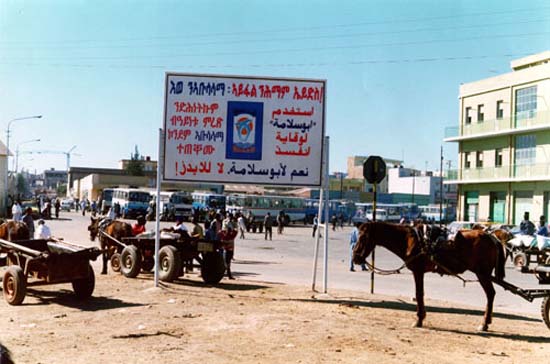
Ex-Peace Corps Members Hopeful on Ethiopia-Eritrea Deal
Ex-Peace Corps Members Hopeful on Ethiopia-Eritrea Deal
Progress in an African War? Ex-Peace Corps Members Hopeful on Ethiopia-Eritrea Deal
By Steven Mufson Washington Post Staff Writer Saturday, March 11, 2000; Page A16
Five former Peace Corps volunteers said yesterday they have made a breakthrough in peace negotiations that could settle a border dispute between Ethiopia and Eritrea that has cost each of the East African countries thousands of lives in fighting over the past two years.
Charles Dambach, one of the former Peace Corps volunteers who have been trying to help mediate the dispute, said that by changing the sequence of implementation measures in the settlement proposed by the Organization for African Unity, the group had resolved a major stumbling block in the talks.
But State Department spokesman James P. Rubin said that while the volunteers were "well-intentioned," their "efforts do not reflect the extent of the problem nor do the private efforts reflect the views and concerns of the leaders of Ethiopia and Eritrea."
Dambach said the hurdle has been that Ethiopia did not want to agree to a cease-fire until Eritrea withdrew to pre-May 1998 borders. Although Eritrea agreed to withdraw to that point, the two sides could not agree on where those borders were.
According to Dambach, Eritrean President Issaias Afwerki said yesterday he would accept a delay in a formal cease-fire until a commission appointed by the OAU demarcates the border in effect before fighting broke out in May 1998. The former Peace Corps volunteers said that Ethiopian officials yesterday said they would guarantee the commission's safety, accept the commission's demarcations and implement a cease-fire after Eritrea withdrew.
Two other important issues remain in the talks: the composition of an observer or peacekeeping force that would monitor the border and whether there would be any limitations on Ethiopian government powers in the disputed area.
But Dambach said that settling the technical issue of how to reestablish the border was critical and would bring an end to fighting between the countries, which split after a long civil war.
Dambach said the breakthrough meant that U.S. and OAU mediators should be able to "get [a deal] to closure."
Last year, a senior State Department official called the volunteers "naive," and yesterday an administration official said the volunteers were "focused on a small subset of the issues" and that theirs was "not a serious effort."
Anthony Lake, former national security adviser and President Clinton's special envoy, returned from a two-week mission to Ethiopia and Eritrea last weekend. On Wednesday, the State Department said that during Lake's trip "consensus was reached on some of the provisions" of technical arrangements, "while others require additional mediation."
In a letter written Thursday, however, Issaias expressed frustration about the lack of progress in talks, lamenting that "the efforts of the past seven months have thus been wasted without any fruit." He complained that "the entire peace package is at a crucial crossroads and literally on the brink of collapse."
The former Peace Corps volunteers--four of whom served in Ethiopia when Eritrea was still part of Ethiopia--said they had discussions later on Thursday and yesterday that overcame the technical issues related to a cease-fire.
"I'm very optimistic," said Ghebre S. Mehreteab, a Washington businessman from Ethiopia who spoke to Issaias yesterday. The former Peace Corps volunteers, he said, "have the trust of the two sides, which is rare." He added that the former volunteers had "uncomplicated the process."
The former Peace Corps volunteers include Dambach, a past president of the National Peace Corps Association; Mike McCaskey, chairman of the Chicago Bears football franchise; John Garamendi, former California state official and former deputy interior secretary; William Canby, U.S. appellate court judge in Phoenix; and Melvin Foote, executive director of the Constituency for Africa.
The two countries went to war in 1998 over a relatively small, mostly barren and sparsely populated area. The war and the maintenance of large armed forces have contributed to the possibility of widespread hunger in the region in the coming months.
